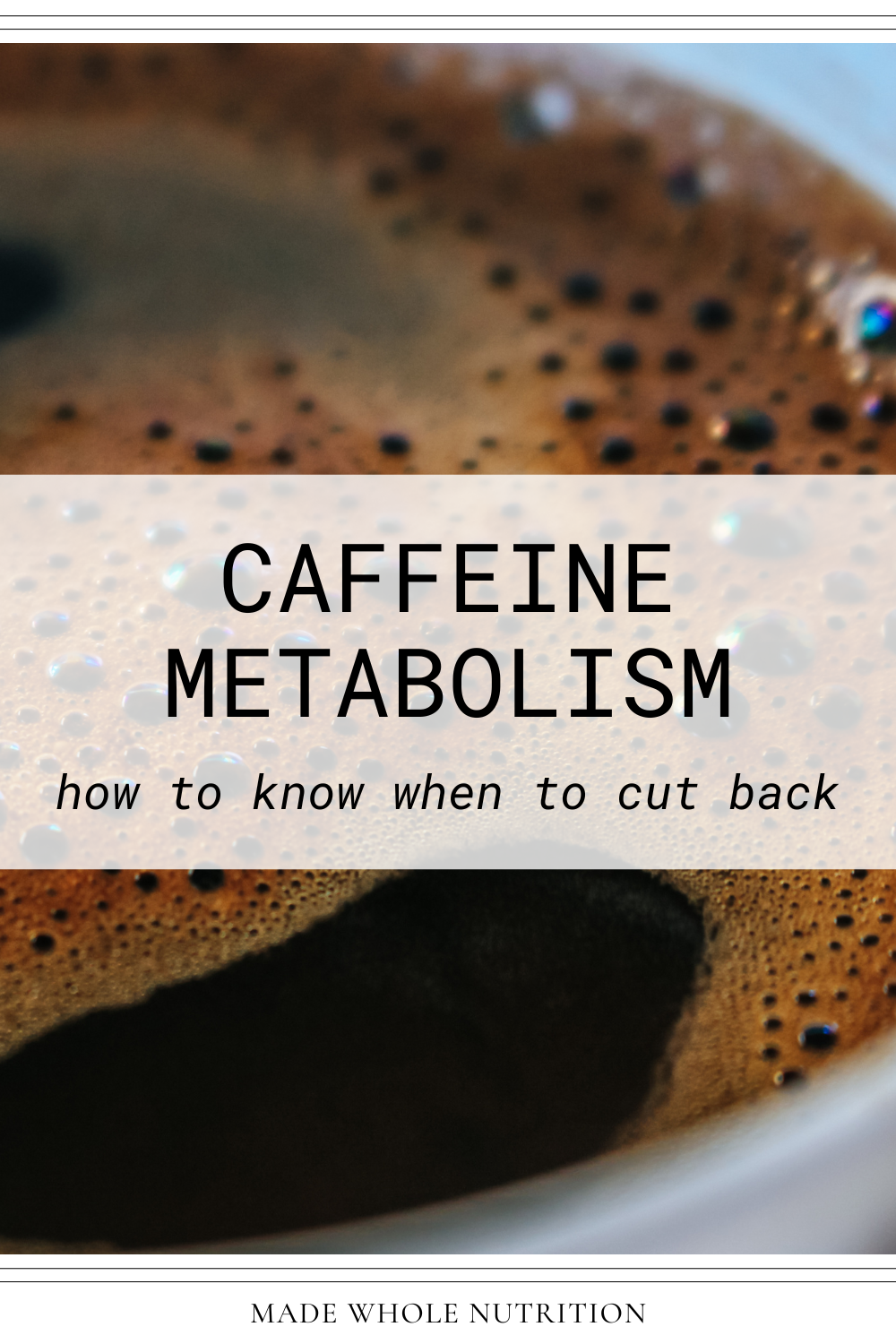Caffeine Metabolism: how to know when to cut back
WHAT IS CAFFEINE?
Caffeine is a plant defense compound naturally found in coffee, cacao, and tea.
The effects of caffeine are very bioindividual, so consider these 3 factors when deciding if moderate consumption is beneficial or if you should cut back:
1. TOLERANCE
Caffeine metabolism in the liver varies by individual.
Fast metabolizers have a higher tolerance for caffeine, while slow metabolizers often get jittery, feel anxious, or experience a "crash" (and need another pick-me-up).
Slow metabolizers also tend to find the taste of coffee more bitter and will often add more sugar to balance it out.
2. OTHER CONDITIONS
Depending on what systems in your body need support, caffeine may or may not be helpful:
In the nervous system, caffeine works by blocking the receptors that transmit signals for sleepiness (but your brain adjusts over time, making it addictive).
Caffeine revs up the adrenal glands, which will boost energy in the short term but can exhaust these glands over the long term.
In the kidneys, caffeine acts as a diuretic to increase urination (and thirst).
Research shows that regular caffeine consumption can be protective against the development of cardiovascular disease and several cancers.
3. SOURCE
Caffeine is one of many bioactive substances we consume which can have synergistic effects on the body.
An example of this is green tea, which contains both caffeine (stimulating) and L-theanine (calming), producing the net effect of calm focus.
In contrast, the high sugar content of a syrupy latte or energy drink increases the addictive and stressful effects of caffeine.
Consider if your caffeine is from whole food or if it is accompanied by added sugars and chemicals.
SHOULD I CUT BACK ON CAFFEINE?
Do I rely on caffeine to get through the day?
Do I have difficulty falling asleep at night?
Do I often feel wired & tired?
Do I have adrenal or thyroid issues?
Do I have high levels of stress?
Do I drink caffeine with lots of sugar?
Do I drink enough water throughout the day?
If you sense you may need to cut back on caffeine, slowly reduce the amount you drink each day until you do not need it. After avoiding for a week or two, reintroduce to identify your reaction.
Are you a health educator that wants to use this content with your clients? Customize the handout template in less time than it would take to even think about hiring a graphic designer.
References
Cappelletti, S., Piacentino, D., Sani, G., & Aromatario, M. (2015). Caffeine: cognitive and physical performance enhancer or psychoactive drug?. Current neuropharmacology, 13(1), 71–88. https://doi.org/10.2174/1570159X13666141210215655
Grosso, G., Godos, J., Galvano, F., & Giovannucci, E. L. (2017). Coffee, Caffeine, and Health Outcomes: An Umbrella Review. Annual Review of Nutrition, 37, 131–156. https://pubmed.ncbi.nlm.nih.gov/28826374/
Masi, C., Dinnella, C., Pirastu, N., Prescott, J., & Monteleone, E. (2016). Caffeine metabolism rate influences coffee perception, preferences and intake. Food Quality and Preference, 53, 97–104. https://doi.org/10.1016/j.foodqual.2016.06.002
Schuster, Julius, Ellen S. Mitchell. (2019). More than just caffeine: psychopharmacology of methylxanthine interactions with plant-derived phytochemicals. Progress in Neuro-Psychopharmacology and Biological Psychiatry. Volume 89, 263-274. https://doi.org/10.1016/j.pnpbp.2018.09.005.
U.S. Department of Health and Human Services. Office of Dietary Supplements. NIH Office of Dietary Supplements. Retrieved from https://ods.od.nih.gov/factsheets/list-all/





